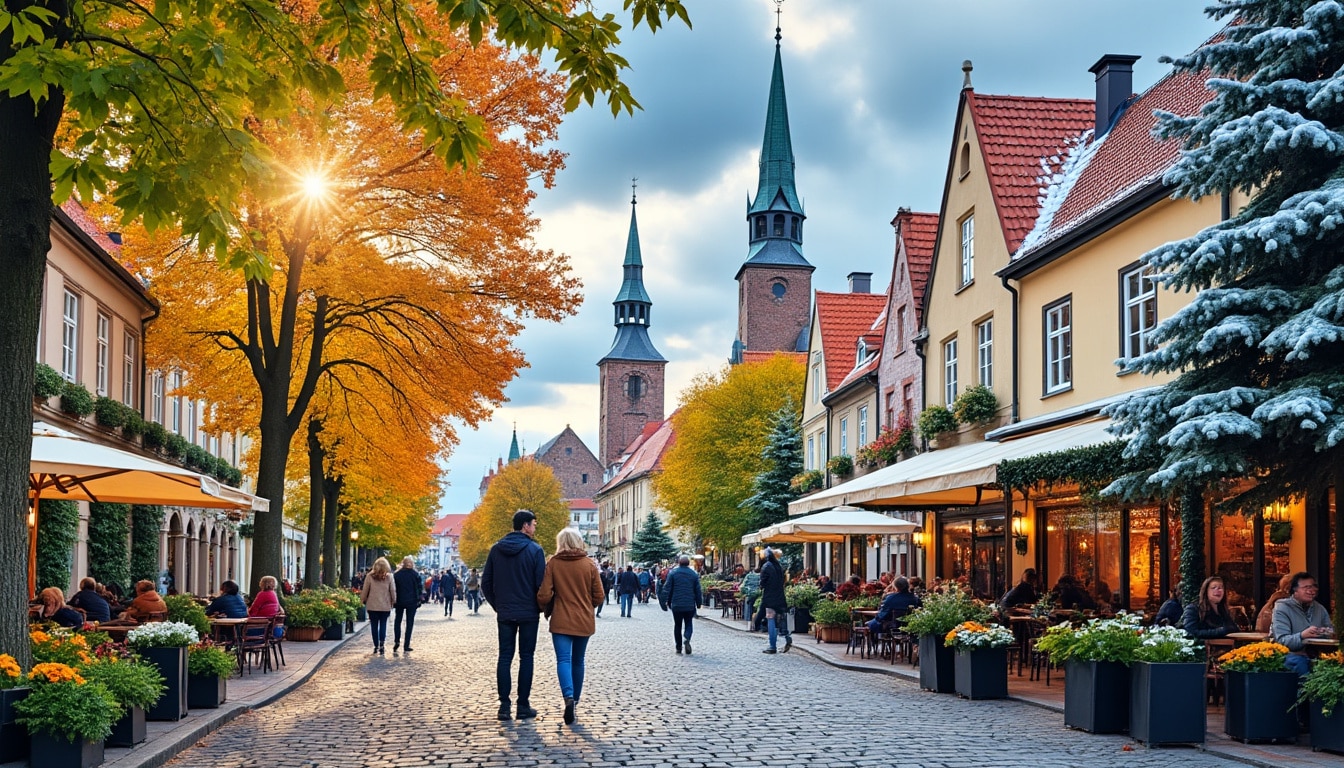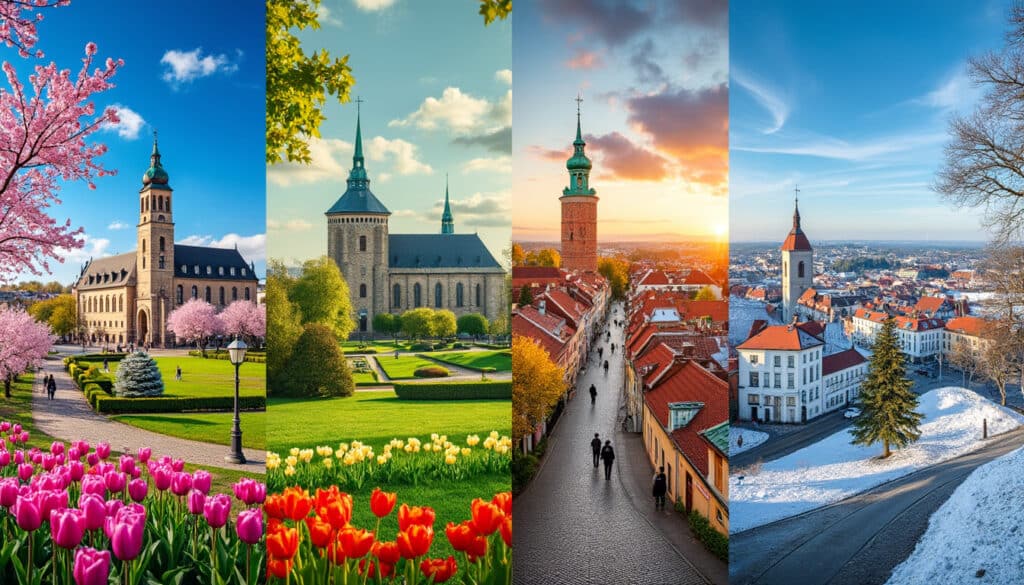Nestled along the Gulf of Finland, Tallinn, the capital of Estonia, is a city that undergoes a fascinating array of seasonal transformations. Known for its picturesque medieval architecture, Tallinn’s climate varies significantly from season to season, offering visitors a unique experience throughout the year. This article delves into the weather patterns of Tallinn, highlighting how temperature, rainfall, and sunshine influence the warmth of this enchanting city across different months.
Understanding Tallinn’s Climate: A Journey Through the Seasons
Tallinn, a city rich in history and culture, experiences a temperate climate with distinct seasons. Summers are mild and moderately warm, while winters can be quite cold with significant snowfall. The city’s proximity to the sea impacts its climate, offering somewhat milder conditions compared to inland areas. While temperatures can vary greatly, the city’s charm remains constant throughout the year, attracting tourists eager to explore its historic streets and vibrant culture.
Winter in Tallinn is quite a spectacle. Starting from late November and often lasting until March, the city becomes a winter wonderland, thanks to regular snowfall. January is typically the coldest month, with average temperatures ranging from -5°C to -0°C. During this time, Tallinn embraces a serene atmosphere, ideal for those who enjoy cozying up in quaint cafes with a cup of hot chocolate. However, it’s wise to pack warm clothing if you plan to visit. Despite the chilly temperatures, winter is a fantastic time to experience the city’s holiday festivities and markets.

Spring emerges gradually in Tallinn, with temperatures slowly rising from around 2°C in March to 14°C in May. The city begins to awaken from its winter slumber, and you can enjoy longer daylight hours. As the snow melts, Tallinn’s parks and gardens come to life, offering a burst of vibrant colors. This season is perfect for exploring the city’s many sights, such as the historic Old Town, and enjoying a leisurely stroll by the seaside.
Summers in Tallinn are mild, with temperatures typically ranging between 16°C to 22°C in July, the warmest month. The city enjoys long daylight hours, sometimes exceeding 18 hours in June. This abundance of sunshine allows for a plethora of outdoor activities, from exploring the lush greenery of Kadriorg Park to embarking on a sea adventure at the Seaplane Harbour. Thanks to the Tallinn Card, tourist attractions are easily accessible, providing an excellent way to discover what the city has to offer.
Autumn in Tallinn paints the city in shades of gold and crimson as temperatures gradually dip. From September through November, the average temperatures fall from around 16°C to 5°C. Autumn is a picturesque time to visit Tallinn, with its crisp air and colorful foliage. However, this season also sees increased rainfall, so carrying an umbrella is advisable when exploring sights like the Estonian Open Air Museum.
Exploring Rainfall Patterns and Their Impact on Tallinn’s Warmth
Rainfall in Tallinn is relatively consistent throughout the year, with slight variations depending on the season. The city receives an average annual precipitation of about 700 mm (27.6 inches), contributing to its lush landscapes and vibrant greenery. While summer experiences slightly higher rainfall, with each month seeing around 70-80 mm (2.8-3.1 inches) of rain, Tallinn’s weather remains generally pleasant.
The autumn months also witness significant rainfall, which can add a refreshing touch to your explorations. Despite the rain, autumn is a cherished time in Tallinn as it transforms the city into a canvas of warm colors. The cooler, wetter conditions can give rise to cozy, indoor activities, like indulging in Tallinn’s renowned Kalev Chocolate or visiting the Kumu Art Museum for a dose of culture.
Winter precipitation mainly falls as snow, adding a magical touch to Tallinn’s medieval cityscape. An interesting aspect of Tallinn’s winter weather is the phenomenon known as the white nights, where the city sees extended twilight hours, creating a serene and almost mystical atmosphere. This provides the perfect backdrop for winter sports enthusiasts, who can enjoy activities like ice skating or cross-country skiing in places like the Nõmme Sports Centre.
Spring and winter are typically drier seasons, with precipitation levels dropping to around 35-60 mm during these months. This pattern contributes to an overall comfortable climate during the warmer months, encouraging outdoor pursuits and leisurely wanderings around the city. Whether you’re taking a Tallinn City Tour or simply enjoying a picnic by the Gulf, the weather is generally accommodating.
Enjoying Long Sunlit Days: Sun Hours and Daylight Variations in Tallinn
One of the most captivating features of Tallinn’s climate is the stark variation in daylight hours between the seasons. This variation significantly impacts the city’s warmth perception. In summer, Tallinn enjoys long, sunny days, with daylight lasting for about 17 hours in June. This is the perfect time for tourists to explore all that Tallinn has to offer, with ample time to visit landmarks such as the Radisson Blu Sky Bar or take leisurely walks through the Tallinna Tehnikaülikool campus, marveling at its blend of modern and historical architecture.
However, winter presents a contrasting picture. The shortest day occurs around the winter solstice, with barely 6 hours of daylight. This seasonal disparity gives Tallinn a charming character, making it a delightful winter escape. The limited daylight hours are perfect for indulging in the cosy ambiance of the city’s numerous cafes and restaurants, tasting local delicacies such as marinated herring or exploring indoor attractions like the Telliskivi Creative City.
On average, Tallinn receives about 1,800 hours of sunshine annually. Interestingly, spring and early summer, despite being transitional periods, receive ample sunshine, with May recording approximately 250 hours of sun. This seasonal abundance draws visitors, encouraging them to partake in activities at the Estonian Air show or leisurely boat rides along the picturesque coastline.
The varying daylight hours also influence the local lifestyle, with residents and tourists alike embracing the opportunity to engage in both outdoor and cultural activities. From enjoying a summer festival or savoring late-night snacks during the white nights, Tallinn’s daylight variations are an integral part of the city’s seasonal charm.
Extreme Weather Events: A Closer Look at Tallinn’s Climate Challenges
While Tallinn’s climate is generally temperate, the city does occasionally experience extreme weather events that can impact its overall warmth. These events are often influenced by broader climatic patterns, such as cold spells from Russia or warm air masses from the Atlantic.
One particularly notable weather event is the occurrence of cold spells, which bring frigid temperatures from Russia, pushing the mercury down to extreme levels. The coldest temperature ever recorded in Tallinn was a bone-chilling -32°C (-25.5°F), recorded in December 1978. Although such extreme cold is less frequent today, winters can still be harsh, requiring locals and visitors to dress appropriately to withstand the chill.
30°C (86°F). The hottest recorded temperature in Tallinn was
34.3°C (93.7°F)
, experienced in July 1994. Such warm spells, although rare, provide a stark contrast to the more frequent cool, mild conditions, offering a unique opportunity to enjoy sunny days on the Baltic beaches.
Flooding is another weather-related concern in Tallinn, particularly during periods of heavy rain. The city’s coastal location makes it susceptible to flooding, which can sometimes disrupt daily life and travel plans. However, recent advancements in urban planning and infrastructure have helped mitigate the impact of such events, ensuring that tourists can continue to enjoy their visit to Tallinn without major disruptions.
Despite these challenges, Tallinn’s climate remains a key element of its charm. Visitors and locals alike have adapted to these variations, finding ways to make the most of whatever weather conditions the city presents. Whether it’s embracing the warmth of a sunny summer day or enjoying the cozy atmosphere of a snowy evening, Tallinn’s climate is an integral part of its identity.
Winter Wonders: Embracing the Cold in Tallinn
Winter in Tallinn offers a magical experience for those willing to embrace the cold conditions. The city, with its historic charm and snowfall, becomes a winter wonderland that evokes images of fairy tales. While temperatures often hover below freezing, the city is well-adapted to manage the icy conditions, ensuring a warm welcome for visitors.
A top attraction during the winter months is the stunning Town Hall Square, which transforms into a bustling Christmas market. With the aroma of spiced mulled wine in the air and the twinkle of festive lights, the market is a must-visit. While the air might be chilly, the warm hospitality and vibrant stalls selling traditional Estonian crafts and treats make for an unforgettable experience.
The snowfall enhances the beauty of Tallinn’s architecture, from the medieval spires of St. Olaf’s Church to the red-roofed buildings of Toompea Hill. Many enjoy taking the Tallinn City Tour, which offers a comfortable way to see the city whilst wrapped in warm blankets. The surrounding countryside also provides numerous winter sports opportunities, from ice skating on frozen lakes to snowshoeing through tranquil forests.
| Month | Avg Temp (°C) | Rain Days | Sun Hours |
|---|---|---|---|
| January | -2/-5 | 11 | 1.77 |
| February | -1/-5 | 10 | 2.55 |
| March | 2/-3 | 8 | 4 |
| April | 7/1 | 6 | 7 |
| May | 14/6 | 7 | 9.5 |
FAQ about Tallinn’s Climate and Temperature
- 🌧️ What’s the wettest month in Tallinn?
August tends to be the wettest month, with around 85 mm of rainfall.
- ☀️ When does Tallinn get the most sunlight?
Tallinn experiences the longest days in June, receiving up to 18 hours of daylight.
- ❄️ When does snow typically fall in Tallinn?
Snowfall usually begins in late November and can last until March, with the heaviest occurring in January and February.
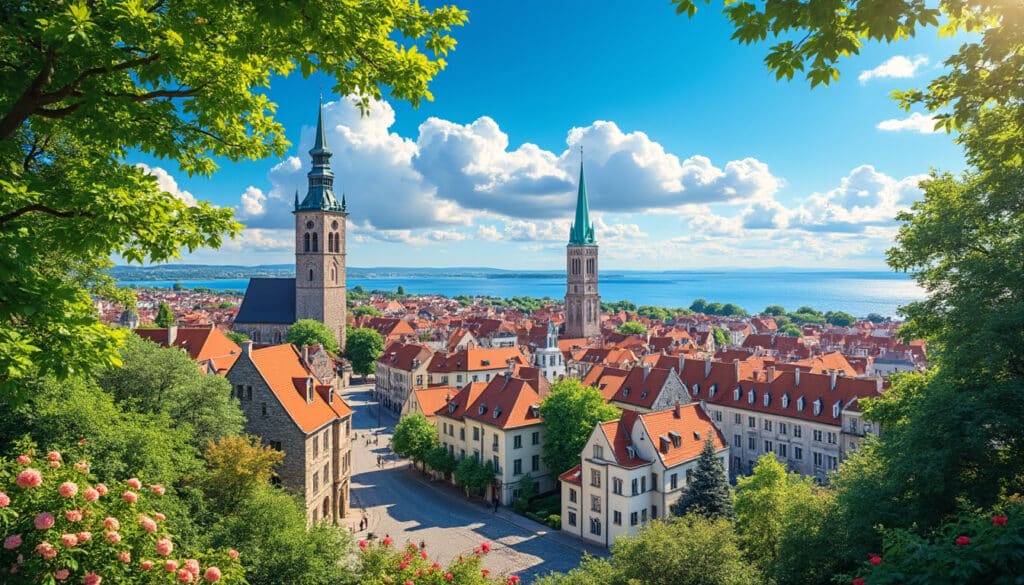
The climate in Tallinn, the capital of Estonia, offers a unique blend of Baltic and continental characteristics, creating an intriguing tapestry of weather patterns throughout the year. From the icy chills of its winters to the gentle warmth of its…

The enchanting city of Tallinn, Estonia, often bewilders visitors with its captivating medieval architecture and cobblestone streets. However, one of the most defining aspects of this Northern European gem is its cold weather, which shapes the very essence of everyday…

Flooding and natural risks in Tallinn
Tallinn, Estonia’s enchanting capital, is renowned for its well-preserved medieval architecture and vibrant culture. However, beneath its charming facade lies a city grappling with the increasing incidence of flooding and natural risks exacerbated by climate change. With heavy rainfall becoming…

Rain and precipitation in Tallinn
🌧️ Tallinn, the charming capital of Estonia, is renowned for its picturesque medieval architecture and vibrant culture. However, what truly defines its atmospheric landscape is the capricious dance of rain and precipitation throughout the year. With varying degrees of rainfall,…

In the charming city of Tallinn, visitors and residents alike are captivated by the enchanting sunrises that paint the sky. With a perfect blend of tradition and modernity, Estonia’s capital offers a picturesque backdrop as the sun makes its grand…
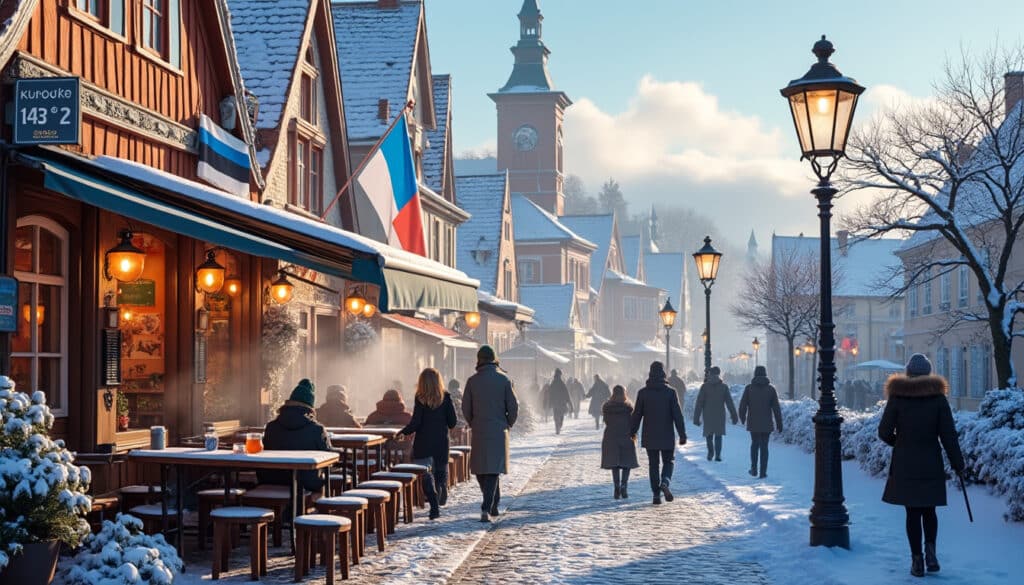
Tallinn, the charming capital of Estonia, is renowned for its rich history, picturesque landscapes, and distinct Nordic climate. The temperatures here, influenced by its location near the Baltic Sea, range from crisp winters to mild summers, making it a unique…
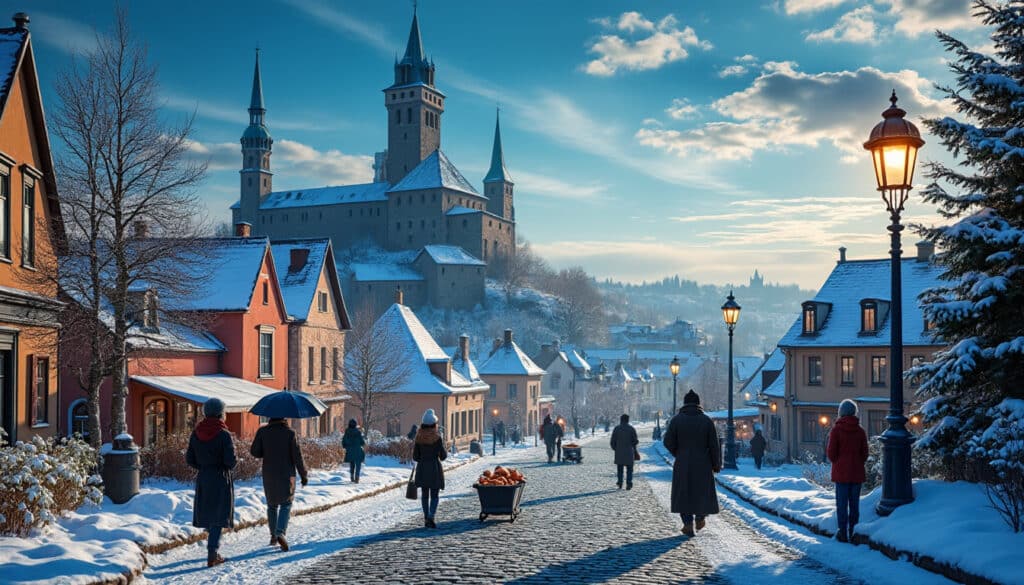
What is the weather like in Tallinn?
Are you planning a trip to Tallinn or simply curious about the weather patterns in this charming Baltic city? Nestled on the northern coast of Estonia, Tallinn experiences a unique climate that beautifully showcases distinct seasons throughout the year. From…
Tallinn, the charming capital of Estonia, is experiencing an unusual surge in temperature this summer. As the sun gleans over the city’s cobblestone streets and historic architecture, both locals and tourists find themselves adapting to the unexpected warmth. From delightful…
Tallinn, the enchanting capital of Estonia, is a city steeped in history and brimming with charm. Known for its medieval architecture and stunning Baltic Sea views, it draws countless visitors and digital nomads alike. However, one aspect of Tallinn that…

